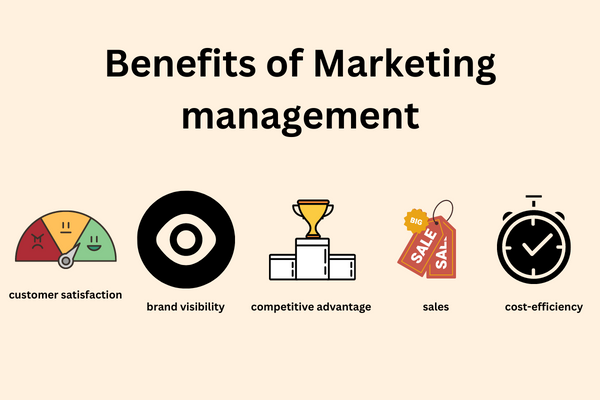Do you want to learn about marketing management and its importance in today’s world? Are you looking for tips and tricks to help you with marketing project management? If so, you’ve come to the right place. In this blog post, we’ll be providing an in-depth guide to what is marketing management is, what it involves, and the steps you need to follow to execute it successfully.
Introduction to Marketing Management
Marketing management is the process of managing all aspects of a company’s marketing efforts. This includes planning, organizing, coordinating, and controlling the activities of the marketing department. It also includes formulating and implementing strategies to reach marketing goals, as well as monitoring and evaluating the effectiveness of marketing campaigns.
The goal of marketing management is to increase the organization’s profits by developing and implementing effective marketing strategies and campaigns. This requires an understanding of customer needs, competitive analysis, and market trends. It also requires a thorough knowledge of the organization’s products and services and how they compare to the competition.
At its core, marketing management is the practice of efficiently and effectively planning, organizing, and controlling resources and processes to achieve maximum customer satisfaction, growth, and profits.

What is Marketing Management?
Marketing management is a process that involves the strategic planning, organizing, and controlling of marketing activities and resources to meet organizational objectives. It includes everything from setting marketing goals and objectives to designing and executing marketing campaigns, measuring results and optimizing performance.
It is a dynamic process, meaning it is constantly evolving as the market changes. It is also a cross-functional process, meaning it involves multiple departments within an organization, such as sales, finance, and operations.
The ultimate goal of marketing management is to create and maintain relationships with customers and other stakeholders, while simultaneously increasing profits. To achieve this, marketing managers must develop and implement strategies to generate customer interest, create demand for products and services, and build loyalty.
The Benefits of Marketing Management
Marketing management is an essential part of any successful business. Without it, businesses may struggle to reach their objectives and maximize their profits. Here are some of the benefits of marketing management:
- Improved customer satisfaction:
By understanding customer needs and wants, marketing managers can create campaigns and strategies to meet them. This will lead to increased customer satisfaction, which can in turn lead to greater profits and customer loyalty. - Increased brand visibility:
Effective marketing management can help businesses increase their brand visibility, which can lead to greater customer awareness and improved market share. - Improved competitive advantage:
By understanding the competitive landscape and developing strategies to differentiate the business from its competitors, marketing managers can give their organization an edge in the market. - Increased sales:
Effective marketing management can lead to increased sales and revenue. - Improved cost-efficiency:
By optimizing the marketing budget and resources, marketing managers can help businesses lower costs and become more cost-efficient.

Types of Marketing Management
Marketing management can be divided into four main categories:
- Strategic marketing management: This type of marketing management involves the development and implementation of long-term marketing strategies. It involves analyzing customer needs and wants, understanding the competitive landscape, and developing marketing plans to meet the organization’s goals.
- Operational marketing management: This type of marketing management involves the day-to-day management of marketing activities. It includes tasks such as managing campaigns, budgeting, and tracking performance
- Digital marketing management: This type of marketing management involves the use of digital channels and technology to promote and market products and services. It includes activities such as website design, SEO, content marketing, and social media marketing. Read this guide to know about digital marketing business.
- Relationship marketing management: This type of marketing management focuses on building relationships with customers and other stakeholders. It involves activities such as customer segmentation, targeting, and loyalty programs.
Steps to Developing a Successful Marketing Management Plan
Developing a successful marketing management plan requires a thorough understanding of the market, customer needs and wants, and the competitive landscape. Here are the steps to developing a successful marketing management plan:
- Set marketing goals: Before you can develop a plan, it is important to have a clear understanding of the organization’s goals and objectives.
- Research the market: Analyze the market and understand customer needs, wants, and preferences.
- Analyze the competition: Understand the competitive landscape and develop strategies to differentiate the organization.
- Identify target markets: Develop customer segmentation and targeting strategies.
- Develop marketing strategies: Develop strategies to reach the organization’s goals and objectives.
- Develop a budget: Develop a budget that allocates resources to each marketing activity.
- Implement the plan: Implement the plan and track the results.
- Monitor and evaluate performance: Monitor and evaluate the performance of the plan and make adjustments as needed.
Challenges of Marketing Management
Marketing management is a complex process and can be challenging to manage. As a newbie in any field, you need to be prepared about the basic challenges and their solutions in order to dodge heavy losses. Here are some of the challenges of marketing management:
- Developing effective strategies: Developing effective strategies can be difficult and time-consuming. It requires a deep understanding of the market, customer needs and wants, and the competitive landscape.
- Managing the budget: Managing the marketing budget can be challenging, as it is important to ensure that resources are allocated efficiently and effectively.
- Tracking performance: It is important to track and measure the performance of marketing activities in order to make adjustments as needed.
- Keeping up with changes: The marketing landscape is constantly changing, and it can be difficult to stay up to date with the latest trends.
The Role of the Marketing Manager
The marketing manager is responsible for managing the marketing department and overseeing all marketing activities. The marketing manager must have a deep understanding of the market, customer needs and wants, and the competitive landscape. The role of the Marketing Manager is to plan, develop, and implement marketing strategies to support the overall organizational objectives. This includes overseeing the development, implementation, and execution of the marketing plan, managing the marketing budget, tracking and analyzing the performance of campaigns, and determining the effectiveness of marketing efforts. Additionally, the Marketing Manager is responsible for leading the marketing team, representing the company to other departments, and developing promotional materials to drive business.
The marketing manager’s responsibilities include:
- Developing and implementing marketing strategies
- Developing and managing the marketing budget
- Analyzing customer data
- Developing and managing campaigns
- Developing and managing relationships with customers and other stakeholders
- Developing and managing digital campaigns
- Measuring and evaluating marketing performance
- Understanding and staying up to date with the latest trends and technologies
Tools and Resources for Marketing Management
Marketing managers have access to a wide range of tools and resources that can help them manage their marketing activities more effectively. Here are some of the tools and resources available:
- Customer Relationship Management (CRM) systems: These systems allow marketing managers to manage customer relationships, track customer data, and create customer segmentation and targeting strategies.
- Digital marketing platforms: These platforms allow marketing managers to develop and manage digital campaigns more effectively.
- Analytics tools: These tools allow marketing managers to measure and evaluate marketing performance.
- Social media management tools: These tools allow marketing managers to manage their social media accounts more efficiently.
- Content management systems: These systems allow marketing managers to create, manage, and distribute content more effectively.
How to Measure and Track Progress in Marketing Management
Measuring and tracking progress in marketing management is essential for making sure that marketing activities are meeting the organization’s goals and objectives. Here are some of the key metrics and techniques that can be used to measure and track progress in marketing management:
- Customer acquisition rate: This metric measures the rate at which new customers are acquired.
- Customer retention rate: This metric measures the rate at which existing customers are retained.
- Conversion rate: This metric measures the rate at which customers take a desired action (e.g. purchase a product or service).
- Return on investment (ROI): This metric measures the profitability of marketing activities.
- A/B testing: This technique involves testing different versions of a marketing campaign to determine which performs better.
- Surveys: Surveys can be used to measure customer satisfaction and get feedback on marketing activities.
- Focus groups: Focus groups can be used to get in-depth feedback on marketing activities.
You may like to read
30 creative 5 Minute presentation topics
Conclusion
Marketing management is a complex process that requires a deep understanding of the market, customer needs and wants, and the competitive landscape. It involves developing and implementing strategies to reach marketing goals, as well as monitoring and evaluating the effectiveness of marketing campaigns.
The ultimate goal of marketing management is to create and maintain relationships with customers and other stakeholders, while simultaneously increasing profits. To achieve this, marketing managers must have access to the right tools and resources, as well as a thorough understanding of the process.
We hope this blog post has provided you with a better understanding of what marketing management is and how it can be used to help your organization reach its goals.
Frequently Asked Questions
What is the role of a marketing manager?
The role of a marketing manager is to develop and implement marketing strategies, manage campaigns, analyze customer data, measure and evaluate performance, and stay up to date with the latest trends and technologies.
What are the benefits of marketing management?
The benefits of marketing management include improved customer satisfaction, increased brand visibility, improved competitive advantage, increased sales, and improved cost efficiency.
What are the 7 principles of marketing?
The 7 principles of marketing are Product, Price, Place, Promotion, People, Process, and Physical Evidence. Product refers to the goods or services offered to consumers. Price refers to the monetary amount customers must pay in exchange for a product. The place is the location where a product is available for purchase. Promotion is the marketing communications put out by a brand. People refer to the overall customer experience. Process refers to how a product is positioned in the marketplace. And Physical Evidence is the packaging or branding of a product.
What are the challenges of marketing management?
The challenges of marketing management include developing effective strategies, managing the budget, tracking performance, and keeping up with changes.
Conclusion
Marketing management is a complex process that requires a deep understanding of the market, customer needs and wants, and the competitive landscape. It involves developing and implementing strategies to reach marketing goals, as well as monitoring and evaluating the effectiveness of marketing campaigns.
The ultimate goal of marketing management is to create and maintain relationships with customers and other stakeholders, while simultaneously increasing profits. To achieve this, marketing managers must have access to the right tools and resources, as well as a thorough understanding of the process.
I hope this blog post has provided you with a better understanding of what marketing management is and how it can be used to help your organization reach its goals.

